News
Page
ESC featured in new podcast
12th November 2025
We’re thrilled to be featured in the latest Exeter Stories podcast!
In the podcast, Alice and Natalie discuss some behind-the-scenes updates, our plans for the future, as well as the story of how it all started.
Listen to our episode and all the episodes so far via the Exeter Stories Linktr.ee:
Huge thanks to Paul Batterham for setting up this inspiring series, and for featuring us in it!

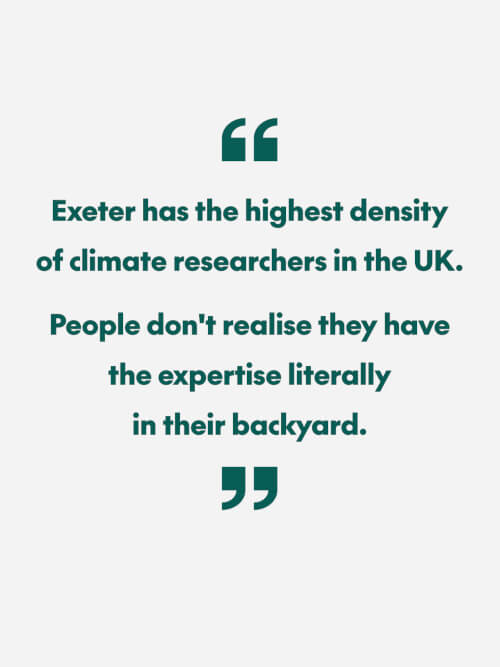
Featured spine health research collaboration
8th October 2025
Huge thanks to UK Research & Innovation (UKRI) for featuring our research collaboration with Prof Jude Meakin in their EPSRC research outcomes and impact series!
We worked with Prof Meakin from the University of Exeter’s Biophysics research group, and her research team from Exeter and Cardiff Universities, in 2022-2023 to develop a public engagement programme of their work; including a website and infographic, and culminating in the featured World Spine Day 2023 consultation event.
We loved how this project enabled residents to genuinely get involved in influencing local research! The researchers were particularly interested in how they should communicate their research, and understanding whether their methods of creating accurate spine models – which need volunteers to take X-rays and MRI scans – would be considered too invasive. It was incredibly helpful to have public participants with experience of / interest in back pain contributing to the discussion, and it has had an important influence on the researchers’ work.
We’re also glad that our contribution as a convenor and mediator of this event was helpful! The article was submitted by Prof Meakin and her team, and says:
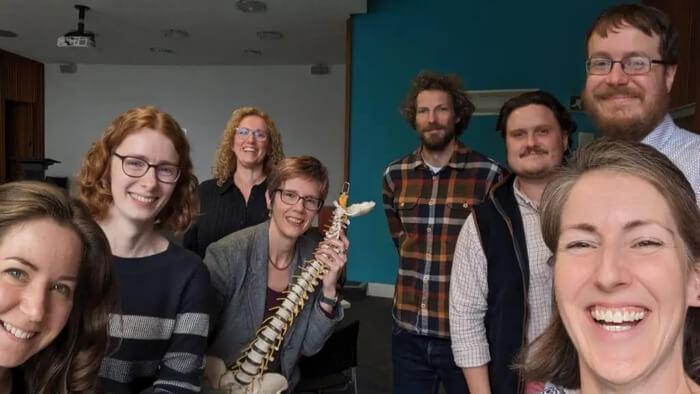
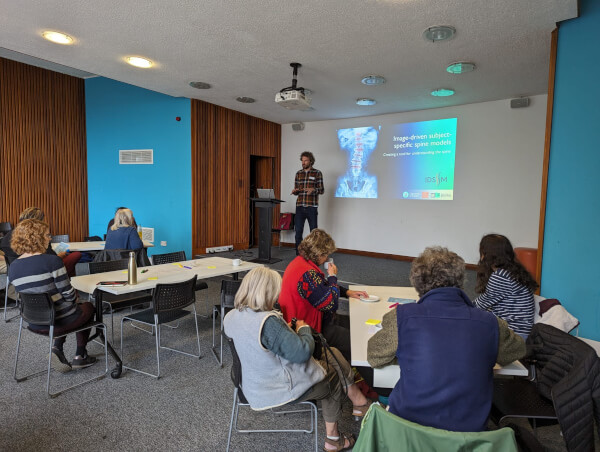
Science centre was critical to successful event
The researchers faced challenges in recruiting people to take part in the engagement event… They turned to Exeter Science Centre, a local organisation that aims to involve the community in science, for help in recruiting people and facilitating the event.
The team’s advice for other researchers doing patient and public involvement was:
– to use professional organisers who can keep you to time and keep you on subject
– not to be afraid to get help with the recruitment and planning.
Jenny added: “One of the takeaways for me was that we would have struggled to carry off that event without the help of Exeter Science Centre.”
Check out the article, and find out more about the project on the project website!
Join our board of trustees!
2nd September 2025
If you love what we do, and want to support our work behind the scenes: join us as a trustee!
We’re looking to broaden the diversity of ideas and experience on our board, and so are looking for proactive individuals with skills / a background in:
– fundraising,
– marketing / branding / comms / media,
– an understanding of the networks & needs of communities in Northern Devon (where we’re working to make our first physical centre).
Could this be you? Have a look at the full details here and apply by 5th October!
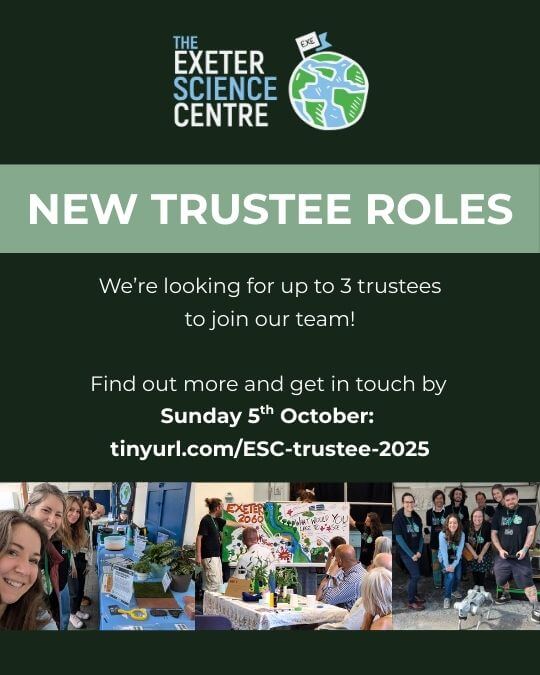
We’re hiring!
26th August 2025
We’re thrilled to announce a new position to support our projects, with a focus in Northern Devon!
It’s a full time position (and we operate a 4-day work week – see below) but we’re willing to discuss part time options for the right person.
Applications are now closed for this position – huge thanks to everyone who took the time to apply!
More info: 4-day work week
We are a now a 4-day work-week employer, without compressed hours, and without a reduction in pay – because the evidence shows it’s best for you, and for us. It’s the kind of change we’d like to see in society, so we’ve implemented it for our own organisation.
This means that full time for us is a focused 32 hours per week, and – for now – across Monday to Thursday during a typical week. When we grow and roles change in future, we may have to adapt this, in consultation with our team.
We sometimes do events and activities on Fridays, evenings or weekends, but we have a fair time off in lieu policy for this.
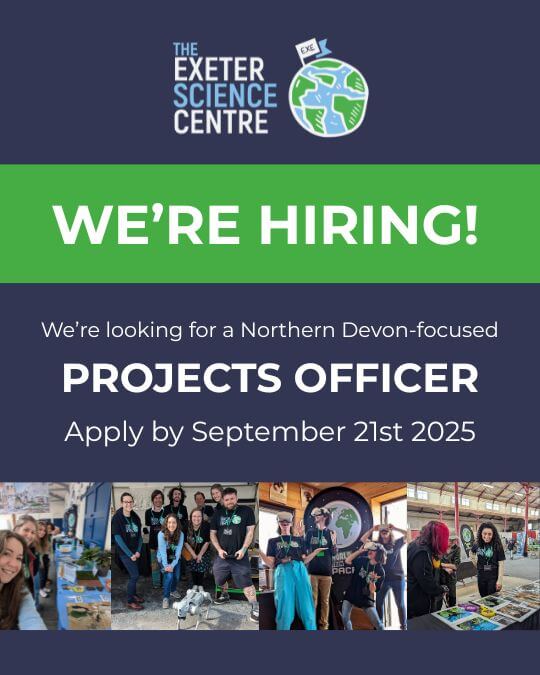
More info: our recruitment process
We are committed to making our recruitment process as fair and safe as possible.
We follow best-practice methods to avoid unconscious bias, and structure our questions and process to value a candidate’s skills, experience, values and suitability for the role:
- We anonymise the first stage of the application process as much as possible, do not ask for detailed information on protected characteristics, and score the answers to each question separately.
- We do not ask for CVs or cover letters so please do not send these to us, we will not consider these as part of an application.
- We understand that interviews are stressful and you’ll perform best when you have time to prepare, so we provide interview questions in advance.
We’re always looking to improve our processes, so get in touch if you think we’re missing anything.
New project: Next Gen Earth!
6th August 2025
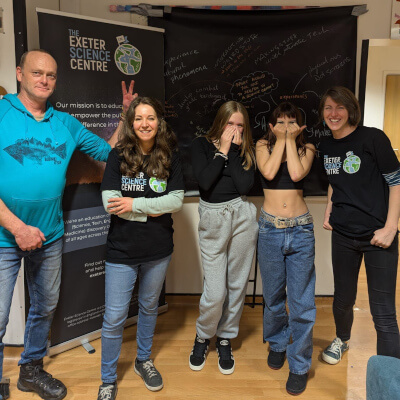
We’re excited to be part of Next Gen Earth!
This is a new UK-wide programme championing youth leadership in environmental science, supported by the Natural Environment Research Council (NERC) and facilitated by the UK Association for Science and Discovery Centres (ASDC).
We will be partnering with SPACE Youth Services to co-develop a youth-led programme, exploring environmental science through the lens of young people’s interests and lived experience in Northern Devon.
Focusing on Bideford and Barnstaple youth centres – close to the proposed site of our first physical science centre – this programme will support us in ensuring our centre is developed inclusively, reflecting local needs and interests.
We can’t wait to get started!

New partnership with the North Devon Biosphere!
6th March 2025
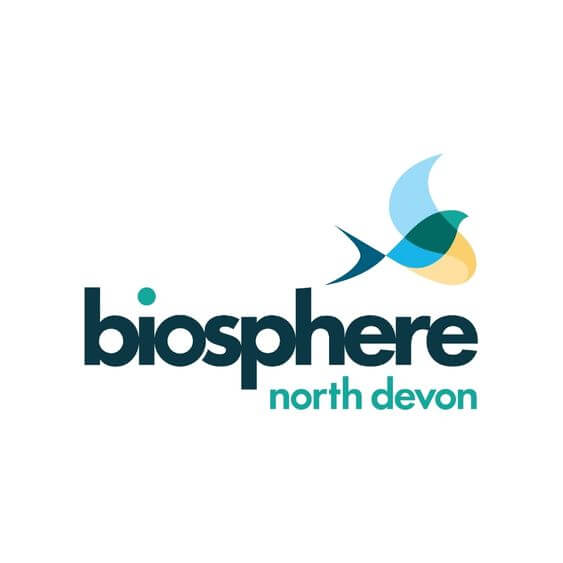
We are delighted to have signed a Memorandum of Understanding with North Devon Biosphere to establish a partnership to work together to better connect people with the incredible UNESCO biosphere reserve in North Devon.
UNESCO states that biosphere reserves are ‘learning places for sustainable development … providing local solutions to global challenges’. This aligns so strongly with our ethos and our ambitions for the region.
We have a shared ambition to create a physical presence in Northern Devon to connect and involve people with the incredible science, innovation and opportunities in the area and the inspiring work of the North Devon Biosphere. We’re so excited by this partnership and to have recently joined the Biosphere Communities Steering Group. Watch this space!
New Project: Livingwalls for NetZero
18th July 2024
We’re thrilled to have been awarded funding from the University of Plymouth’s Net Zero Solutions Fund for our new project: ‘Livingwalls for NetZero (LNZ): A live research and engagement project’.
This funding is supporting University of Plymouth researchers to work with us and Western GeoBuild (the living wall contractors) to design, monitor and engage the public with a living wall on the Melo Cafe, below our new office!
We are determined that the science centre buildings that we create are good for both people and planet – and we have always intended to cover them with green walls (living walls) which formed a live research project. The Lumi and Melo team were keen to improve the aesthetics of their building with a living wall (Lumi Therapy are funding the living wall itself) so this is the ideal opportunity to investigate and highlight the benefits of living walls while we don’t have a building of our own yet!
The focus will be on optimal green wall plant and soil choice for carbon sequestration and insulation properties, longevity, and also the wider benefits for biodiversity, sound reduction, wellbeing and flood-risk reduction, some of which may be investigated via student projects. We’re particularly excited to be using locally-sourced plants and growth medium, which will include biochar for added nutrient, water retention and carbon sequestering benefits.
We’re aiming to install the living wall in early Autumn. In the meantime, we’re collecting data to compare to when the living wall is in place, and planning our public engagement activities.
We’re also really grateful to the University of Plymouth and Devon County Council for involving us in the Net-Zero Exchange Internship and Leadership Programme. They are generously providing us with an intern to support our work on this project – see below.


Project update: Meet our new intern!
23rd September 2024
We’re delighted that Amy Thomas has joined this week as our new Livingwalls for NetZero Intern! Find out more about Amy:

Hi, I’m Amy and I’m currently in my final year studying for a BSc in Environmental Science at the University of Plymouth. I am excited to work alongside all the environmentally passionate people at ESC and help promote and monitor their living walls project!
The soon to be installed living wall is a nature-based solution (use of nature and natural processes to mitigate socio-environmental issues) and will provide a variety of benefits to the environment such as cooler surrounding temperatures, increased biodiversity and a new carbon store. This structure is a part of ESC’s wider ambitions to Make Exeter Cooler; using nature-based solutions to reduce the land surface temperature in summer (and all the additional benefits for people and planet).
Personally, I am intrigued to see not only the environmental benefits but the social ones too as the living wall will improve the appearance of the building and provide overall community enjoyment. I hope that local companies and organisations will be inspired by our living wall and construct their own as well!
I’m excited to see where this project goes over the next few months!
Stay tuned for updates as we start our public engagement activities on the new project landing page, and via our social media!
ESC support package from Lumi Therapy
26th April 2024

We are so grateful to Lumi Therapy for providing an incredibly generous support package to help us grow over the coming year.
Lumi, the wellness brand based in Marsh Barton, Exeter, has pledged an unrestricted donation towards our core costs, funding our website update as well as providing office and storage space. We are overwhelmed to receive this support, and this is a much-needed boost to help get us off the ground in the coming year!
We are at a real turning point for our organisation in 2024: our project work has demonstrated what we can do and the impact it can have, as well as highlighting the huge demand for science engagement opportunities in the region. However, with much of our funding so far being small-scale projects (typically between £1-10k) we have not had the time nor resources to grow our team and expand our operations, to get to a sustainable scale. In addition, we have a number of potential projects and partnerships on the horizon, including the development of the physical buildings, and running community-led projects on tackling the local effects of global issues, which we intend to be a long-term component of our community engagement work. These innovative projects take time to develop and apply for, and we have not yet had the capacity to pursue these opportunities.
This injection of support will be game-changing for us: it’s enabling us to increase the Directors’ pay to the median salary in the region from the Real Living Wage, so then we can take on staff at competitive salary levels.
We can’t thank Lumi enough for supporting us, and we’re really looking forward to working with them to develop the living wall on the front of their building! Stay tuned on our social media and newsletters for updates on this project as well as our upcoming staff vacancies.
Our new registered office address is 1 Marsh Green Road, Marsh Barton Trading Estate, Exeter, EX2 8NY – we don’t (yet!) have a space for public visitors though, so please email us for any enquiries. We’re really grateful to Kaleider for providing our previous registered office address, since first registering as a CIC in 2020!
Citizen Phage Library publication
20th February 2024
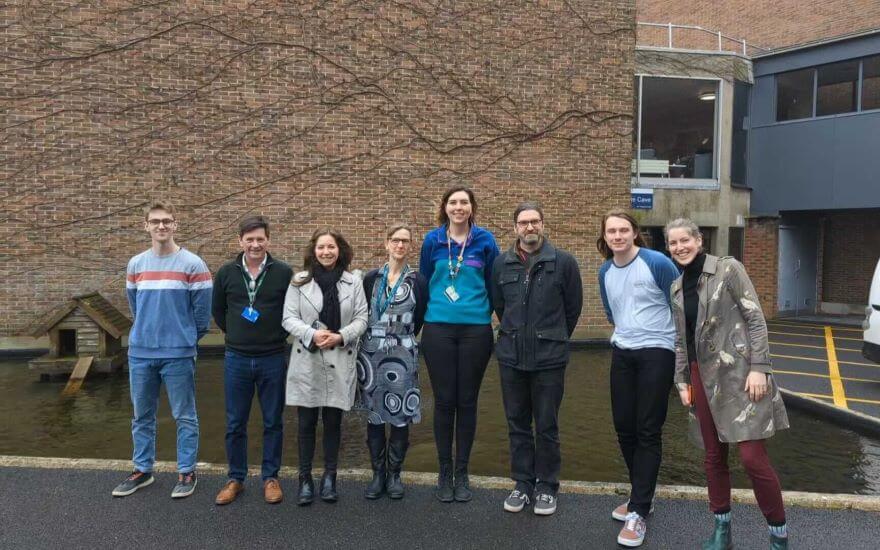
We are thrilled to be co-authors on a recent publication about the Citizen Phage Library (CPL)! We worked with the academic team from the University of Exeter on engaging Citizen Phage Hunters with the project from 2021-2022, and you can find out more on our project resource page. Hopefully this paper will inspire other groups around the world to develop similar programs!
The paper, published in the journal Microorganisms, describes this important work in tackling antibiotic resistance through the power of citizen science. The scientists screened water samples from citizens and wastewater from the Environment Agency with a rapid turnaround. Despite their small lab team, they were able to isolate over 160 potential phages for each strain within five days, sequence an optimised selection within 14 days and select final phages for use in cocktails within 20 days – check out our video lab tour to understand this process.
Antimicrobial resistance is considered as one of the top global public health and development threats, and the work of the CPL could be a really crucial solution. Phages are routinely used in Eastern Europe, and one of the challenges now is to work with regulators and clinicians to get the regulatory framework in place, along with the facilities and safe clinical procedures, so that phages could be used in routine treatments in the UK and Western Europe. The Citizen Phage Library could be an important ‘biobank’ to identify, store and supply phages for patients in the UK, Europe and worldwide – and the CPL team have already supplied phages from the Library to be used in Australia, the US and Canada.
There are now well over 1000 phages in the Citizen Phage Library, and we’re so grateful to all the Citizen Phage Hunters who have contributed so far! We really hope to continue supporting this important project, and fingers crossed the CPL will secure funding to expand their operations.
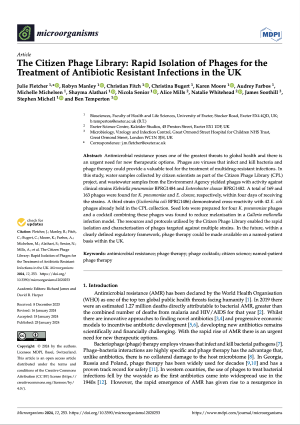
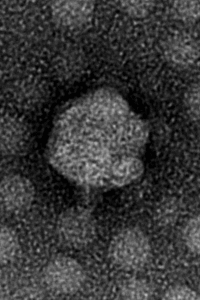
Phages discovered in the River Exe
As part of the project, Natalie and Alice did some water sampling and found 3 phages in the River Exe by the flood relief channel, Exeter Quay and the Exeter Ship Canal, and these phages are now part of the Citizen Phage Library! They’ve affectionately been named ExeSciCentre, ExeQuayColi, and EXEpedition – and you can see ExeQuayColi doing its thing against E. coli in a petri dish – we are very proud phage parents!

British Science Festival Community Grants Partner: blog post of our reflections
30th January 2024
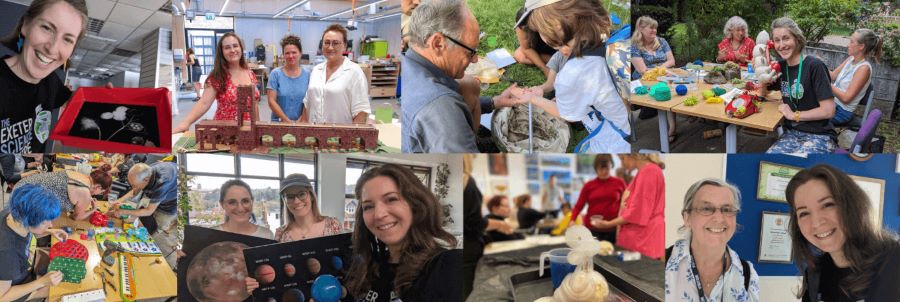
We were delighted to facilitate the British Science Festival Community Grants when this national festival came to Exeter in 2023! In our blog post for the British Science Association, we’ve shared our reflections of this experience, and how it will shape our ongoing work with communities and organisations in the region.
We are so grateful for our core costs funding from the Postcode Local Trust, which enabled us to dedicate our time to this unique project: building new connections with community organisations, and supporting how they engaged their communities with science in meaningful ways. We worked with some really inspiring groups, and we are determined to maintain and build on these connections in future.
Community engagement and empowerment is an important part of what we do: over the past year, as well as being the BSF Community Partner, we’ve collaborated with underserved & underrepresented groups for our Climate Exhibition 2023 and participated in the Mindsets + Missions cohort – we’ve learnt so much through these experiences, and we can’t wait to grow our team and capabilities so we can reach more people, more regularly.
We’re approaching the end of our third year as a charity at the moment, so we’re revisiting our business plan and are working to articulate all the things we want to do and how we intend to do it (this is not an easy task – we have so many ideas!). But our end goal, and our reason for being, has never been clearer – we express this in our final reflections in the blog post, which we’ve copied below:
“A lasting benefit of this experience for us is a deeper understanding of community action in the city where we are establishing ourselves. We aim to create a bold new amalgamation of educational charity, community organisation, cultural hub and tourist attraction, with the aim of reaching people from a wide range of ages and backgrounds. Our ultimate aim is to empower people to make a difference in the world, and we strongly believe that we need to work together to do this, building a collaborative ecosystem of the public, researchers, industry and organisations working for a better future. By helping to facilitate the community grants scheme, we had a taster of the work and needs of just a small sample of the brilliant organisations operating in our local area. This has reinforced our desire to better connect everyone, as part of the ecosystem that we’re trying to create in the city and region.“
Our blog post for the British Science Association
Stay tuned for more updates on how our organisation develops over the coming months. In the meantime, find out how you can support our work here!

Page